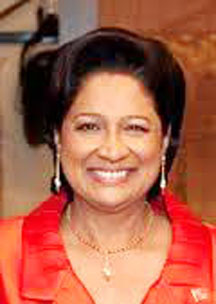(Trinidad Express) Prime Minister Kamla Persad-Bissessar has directed that Defence Force Reserves be called out to assist in maintaining law and order in the country.
The decision to call out some 400 reserves was taken during a meeting of the National Security Council on Tuesday, Persad-Bissessar told reporters during a visit along Piccadilly Street, Port of Spain, on Wednesday, where police and soldiers were on an exercise. She said the decision had nothing to do with threats by police officers to stage “sick-out” action in protest of the five per cent increase in salaries offered by the Chief Personnel Officer (CPO).
Persad-Bissessar also stated that she does not believe the police will intensify their action and confirmed that she intends to meet the Trinidad and Tobago Police Service Social Welfare Association executive next week.
Police officers staged two consecutive days of sick-out action last week, temporarily affecting security at the private residence of Persad-Bissessar, Attorney General Anand Ramlogan and Chief Justice Ivor Archie.
Addressing members of the media on Wednesday after visiting police and soldiers who were part of the exercise, the Prime Minister said the decision to call out the reserves is to strengthen the visibility of law enforcement officers throughout major crime hot spots.

She said, “Yesterday (Tuesday) I gave the go-ahead for the reserves, all reserves of the Defence Force, to be called out. So that we intend to strengthen the troops on the ground throughout the country from today and carrying it forward. This initiative could not be more timely, given that we will have the festivities of Carnival. So I thank the officers from the Police Service (and) from the Regiment, who have agreed to have a collaborative effort, an intensified effort in the fight against crime.”
She added, “We had a five-hour Security Council meeting last (Tuesday) night on planning the way forward. We will roll it out. I think it has been intensifying within the days and weeks to come. Visibility is one area which we discussed. I can say that because it is what you are seeing here today (yesterday) and in other parts of the country. High visibility of law enforcement and Defence Force jointly in this effort. It is on the card and will be happening.”
Persad-Bissessar also said the dismantling of the Special Anti-Crime Unit (SAUTT) will in no way compromise the safety and security of the country. She said officers assigned to the unit will return to their substantive law enforcement agencies.
“They (SAUTT officers) have not stopped working. They continue to work. What was happening is that we had so many agencies, everything was scattered. We are not going to lose the expertise of these officers. Indeed, we will come together and work together, so that is the plan that we have in mind,” she said.
Meanwhile, acting Deputy Commissioner of Police in charge of Anti-Crime Operations Raymond Craig admitted there was a high number of homicides in January. He said, however, that a recent initiative (CCTV Response Unit) undertaken in the East Port of Spain community had resulted in a reduction in criminal activities.
He promised that with the assistance of other law enforcement agencies, the police will relentlessly pursue the crime scourge plaguing the country. He said in east Port of Spain, a known crime hot spot, there had been a 30 per cent decrease in serious crimes.
“That 30 per cent is good. Well we need to go more and that’s what we are working together to do,” Persad-Bissessar interjected.




